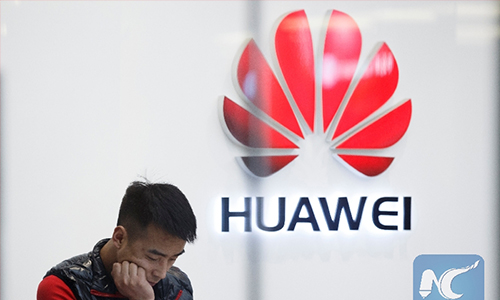
Photo: Xinhua
A Wall Street Journal (WSJ) report that claimed Huawei received $75 billion from the Chinese government is based on "false information and poor reasoning," and Huawei's cumulative subsidies from both Chinese and foreign governments in the past decade only accounted for 0.3 percent of its revenue, the Chinese tech company said in a statement sent to the Global Times on Thursday.The WSJ report is in line with the Washington side's efforts to crack down on the development of Huawei not only in the US market, but also around the world, and to artificially form a so-called logical relationship that the company had close relationships with or was even a part of the Chinese government, which made it not secure, experts said.
"Every tech company that operates in China is entitled to certain subsidies ... Huawei has never received any additional or special treatment [from the Chinese government]," said the statement. It noted that in 2018 alone, the subsidies Huawei received from Chinese and foreign governments represented only 0.2 percent of its total revenue.
Huawei said in the statement that it will reserve the right to take legal action to protect its reputation.
"The WSJ has run a slew of irresponsible 'selective reporting' on Huawei that drastically impact our reputation… we have to question the WSJ's motives and purposes in publishing the article," it noted.
The report selectively chooses to compare Huawei's support from governments with that of Nokia and other tech firms in northern Europe, and led to the result that Huawei must have an abnormal relationship with the government since it received more support than European companies did from each government. The report did not compare Huawei's situation with those of other domestic, similarly sized high-tech firms that also receive support from Chinese governments.
The WSJ claimed in the article published on Wednesday that "tens of billions of dollars" in subsidies from the Chinese government helped Huawei undercut rivals' prices by some 30 percent and rise to top global telecom equipment maker.
It also hinted that Huawei has a close link with the Chinese government, indicating that Huawei could install backdoor programs under "Beijing's request" which is exactly what US politicians have alleged. Such claim is widely believed to be an excuse for Washington's bullying tactic to crack down on China's rise.
The accusation was ungrounded and lacks common sense, Xiang Ligang, an expert in the telecoms industry, told the Global Times.
The real purpose of such misleading overseas reports was to discredit Huawei and other Chinese enterprises, he said.
In response, Huawei said it is a private company wholly owned by its employees. "Huawei's relationship with the Chinese government is no different than that of any other private company that operates in China," it noted.
It is a normal phenomenon for enterprises worldwide to receive subsidies from governments, not only in China, Xiang said. However, what governments want is actually the benefits brought about by enterprises, including jobs, investment, tax revenue and others.
In contrast to the WSJ's speculation, heavy investment in research and development (R&D) is a key driver behind Huawei's innovation and success, Huawei said. About 10-15 percent of Huawei's annual revenue is channeled into R&D.
For a world-class tech giant like Huawei, which recorded over 700 billion yuan in business revenue a year, it is impossible for it to develop based on government subsidies, Xiang said.
In addition, Huawei releases its financial reports every year even though it is a private company, which record clearly its revenue, taxes, and subsidies, Xiang said, noting that the overseas report was biased.
Huawei's investment in 5G has hit $4 billion, more than the total 5G investment from all major equipment vendors in the US and Europe combined.

